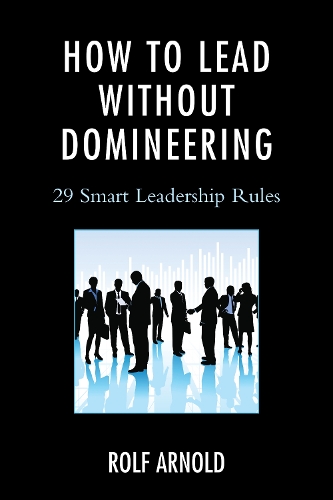
How to Lead without Domineering: 29 Smart Leadership Rules
(Paperback)
Available Formats
Publishing Details
How to Lead without Domineering: 29 Smart Leadership Rules
By (Author) Rolf Arnold
Bloomsbury Publishing PLC
Rowman & Littlefield Publishers
21st May 2014
United States
Classifications
Professional and Scholarly
Non Fiction
371.2011
Physical Properties
Paperback
148
Width 155mm, Height 228mm, Spine 10mm
213g
Description
How to Lead without Domineering: 29 Smart Leadership Rules is a tool book that contains valuable suggestions for self-reflection by leaders in a variety of roles on the job, in a honorary post, or in any other context. Leaders reach their own limits and the limits of others, but how can they overcome these limits What is characteristic for a good leader and how is it possible to achieve ones objectives in cooperation with others Wise leaders support contexts, form relationships, and promote spirit by consolidating the momentum or the dynamic of groups, teams, and organizations. These leaders rarely use commands or lay down the law. Clever leadership implies taking risks, as leaders who adopt the principles of this book give up one-dimensional arguing and if-then-logic statements. Dr. Arnold presents different tools for clever and effective leadership and shows how typical challenges for today's leader can be met. His book is based on recent scientific findings in the field of leadership research and on almost thirty years of practical experience as a leader, supervisor, and coach within different fields and organizations worldwide.
Reviews
This is a book for which we waited a long time. For too long, emotionally-poor leaders have damaged our people and weakened our organizations. Rolf Arnolds book is a new starting point for emotional literacy for leaders. It opens our minds, providing us with prudent rules, tools, and instruments about the art of leading yourself, other people, and organizations. Arnolds views are a breath of fresh air. I have learned much. -- Dr. Ulrich Erhardt, chief executive officer, Denkmodell International Consulting, Berlin, Germany
Author Bio
Professor Dr. Rolf Arnold, born in 1952, obtained his PhD at the University of Heidelberg, worked thereafter in an International Adult Education Centre, obtained his postdoctoral qualification at the Distance University of Hagen, Germany, in 1987, and has been working since 1990 at the Department of Pedagogics (in the fields of Vocational and Adult Education) at the Technical University of Kaiserslautern, Germany. He is also Scientific Director and Chairman of the Board for the Distance and International Studies Centre (DISC), andand the Speaker of the Virtual Campus RhinelandPalatinate (VCRP).
